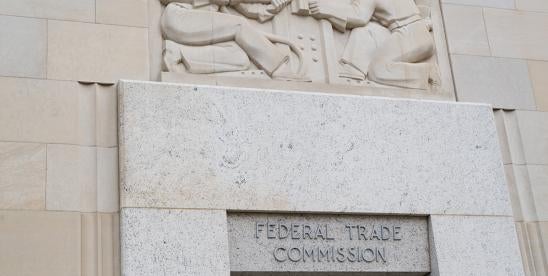On Tuesday the Federal Trade Commission (FTC) voted to authorize publication of a final rule – the Non-Compete Clause Rule (the “Rule”) – in the Federal Register. The Rule ultimately bans employers from entering into, maintaining, enforcing, or threatening to enforce agreements that prohibit a worker from seeking or accepting employment with another person or business after the conclusion of the workers’ employment with the employer. The final rule differs slightly from the initial proposed rule as it permits existing non-compete agreements with “Senior Executives” (as defined in the Rule and discussed in more detail below) to continue in effect while it bans almost all other non-compete agreements and further precludes the creation of new non-compete agreements with “Senior Executives” and other workers going forward.
On what basis does the FTC promulgate the Rule?
Section 5 of the Federal Trade Commission Act, 15 U.S.C. 45 (FTC Act) declares that “unfair methods of competition” are unlawful and further directs the FTC to “prevent persons, partnerships, or corporations … from using unfair methods of competition in or affecting commerce.” Section 5 has long been interpreted to expand the scope of the FTC’s antitrust enforcement authority beyond the reach of the federal antitrust laws – the Sherman Act and the Clayton Act – but the extent of that reach has been the subject of much debate in recent years. Historically, it was the policy of the FTC to exercise Section 5 authority only in narrow circumstances. In July 2021, however, the FTC rescinded its policy statement on Section 5. In November 2022, the FTC issued a new policy statement indicating that “unfair” competition includes, among other things, conduct that “tends to foreclose or impair the opportunities of market participants.” Arguably consistent with that interpretation of Section 5, the FTC has now announced that it will promulgate the Rule, which provides that it is an unfair method of competition for an employer to enter into or attempt to enter into a non-compete clause with a worker, maintain with a worker a non-compete clause, or represent to a worker that the worker is subject to a non-compete clause.
Many employers are aware that antitrust laws already limit their ability to implement broad non-compete provisions. The FTC claims that recent empirical research has shown that even the use of limited non-competes negatively affects competition in labor markets, suppressing earnings for workers, including those who are not subject to non-competes. The FTC further claims that recent research has shown that non-competes tend to negatively affect competition in product and service markets, “suppressing new business formation and innovation.” It is the FTC’s position that these findings warrant promulgation of the Rule.
What does the Rule specifically require?
The Rule is extremely broad, going beyond traditional non-compete agreements and would include any provision that the FTC determines would function as a non-compete restriction. A typical or traditional non-compete clause prohibits an employee from working for a competing employer, or starting a competing business, within a certain geographic area and period of time after their employment ends. A non-compete clause may be part of the employee’s employment contract or may be contained in a standalone contract. Employers and employees may enter into non-compete clauses at the start of, during, or at the end of a worker’s employment.
The Rule defines the term “non-compete clause” as a contractual term between an employer and a worker that prevents the worker from seeking or accepting employment with a person, or operating a business, after the conclusion of the worker’s employment with the employer. Whether any particular contractual provision would constitute a non-compete clause covered by the Rule depends not on what the provision is called but on how the provision functions.
The Rule does not specifically address other types of restrictive covenants, such as non-disclosure agreements (NDAs) or client or customer non-solicitation agreements. The FTC explains that these provisions are not covered by the Rule because they generally do not prevent a worker from seeking or accepting employment with an employer. However, the Rule could cover such provisions if they are so unusually broad in scope that they essentially function as a non-compete agreement. Moreover, employee non-solicitation agreements, or no-poach agreements, may raise antitrust concerns even though they may not violate the Rule.
The Rule defines an “employer” as a person – the term “person” is defined in 15 U.S.C. § 57b-1(a)(6) – that hires or contracts with a worker to work for that person. The Rule clarifies that a “worker” is an employee, individual classified as an independent contractor, extern, intern, volunteer, or sole proprietor who provides a service to a client or customer.
What impact does the Rule have on existing non-compete agreements?
The Rule further requires employers to rescind any existing non-compete clauses by the “effective date” of the Rule, which will be 120 days after publication in the Federal Register. The earliest scenario for such publication would be sometime this month, making it effective sometime in August 2024.
The Rule requires that employers rescind non-compete clauses by providing current and former workers that have such agreements with “clear and conspicuous” notice, informing impacted workers that their non-compete clause will not be, and cannot legally be, enforced against the worker. The Rule includes model language that satisfies its notice requirement, and its use establishes a “safe harbor” demonstrating compliance for employers who use such language.
Are there any exceptions to the Rule?
There are a few key exceptions to the Rule, all of which are narrow in scope. First, the Rule does not apply to existing non-compete agreements between an employer and the employer’s “Senior Executives.” Importantly, this exception only applies to an existing non-compete agreement for such “Senior Executives” and the Rule will still prohibit the creation of any new non-compete agreement going forward even for “Senior Executives.” The Rule defines a “Senior Executive” as a worker who was or is in a policy-making position and received a total annual compensation of at least $151,164 in the preceding year or when annualized if the worker was only employed for part of the preceding year, or in the year preceding the worker’s separation subjecting the worker to the non-compete clause. Notably, the Rule’s definition of “Senior Executive” is quite narrow, and likely will exclude many traditionally considered to be senior executives.
The Rule provides a second limited exception for a bona fide sale of a business entity, permitting a non-compete restriction on the seller as part of what is purchased when the buyer acquires the seller’s ownership interest in the business. While the Rule identifies this limited exception, it further notes that non-compete clauses covered by this exception would remain subject to federal antitrust law as well as all other applicable law.
The Rule also excepts existing causes of action where a cause of action accrued prior to the effective date.
Finally, the Rule does not apply to the category of nonprofit entities, which the FTC does not have jurisdiction to regulate.
Impact on state laws governing non-compete agreements
The Rule provides a floor, but not a ceiling, in the area of banning non-compete clauses. It specifically provides that it supersedes all state laws, regulations, orders, and interpretations of them that are not consistent with the Rule’s requirements – the floor. Nevertheless, states can still impose requirements and restrictions with respect to non-compete clauses if they afford workers greater “protections” than those provided by the Rule – the ceiling.
What’s next?
The Rule will certainly impact one of the traditional tools incorporated by employers seeking to protect their legitimate business interests and their investment in training and developing significant and well compensated employees. However, during the months to come when this Rule will undoubtedly be challenged, employers are well advised to carefully review their other traditional restrictive agreements such as non-disclosure and non-solicitation agreements to refine these agreements and more narrowly tailor them to protect the employer’s confidential information and legitimate business interests to ensure that they are not viewed as functional non-compete agreements. Such an analysis should further consider the policies and protocols used to protect the employer’s trade secrets. Sills Cummis has been encouraging its clients and working with many on trade secret protection programs, which now should be viewed as critically important in light of this further development in an already weakening national landscape concerning non-compete agreements. Trade secret laws can protect an employer’s sensitive non-public information, which is generally what is used by departing employees who unfairly compete. The ability to seek court intervention to protect such information and to obtain damages starts with the company being able to demonstrate that it took reasonable steps to protect its information. Whether or not this new Rule survives challenges, having other means of protecting a company’s sensitive information from unfair competition is critically smart business.
Final comments
As of this writing, two lawsuits challenging the new Rule have already been filed, and key to the timeline regarding when the Rule becomes effective will be whether a court issues an injunction to prevent the Rule from becoming effective while the challenges are heard. Separately, within the Rule itself, noticeably absent are specifics about enforcement and penalties. The supplementary information the FTC issued contains the following statement, “The Commission cannot obtain civil penalties or other monetary relief against parties for using an unfair method of competition, although it can obtain civil penalties in court if a party is ordered to cease and desist from a violation and fails to do so.” Employers are encouraged to seek legal guidance given these uncertainties.






 i
i

